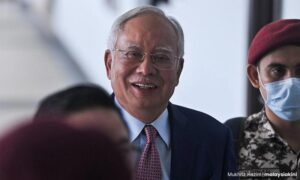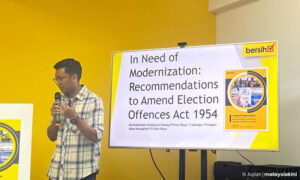By Ida Lim | Malay Mail
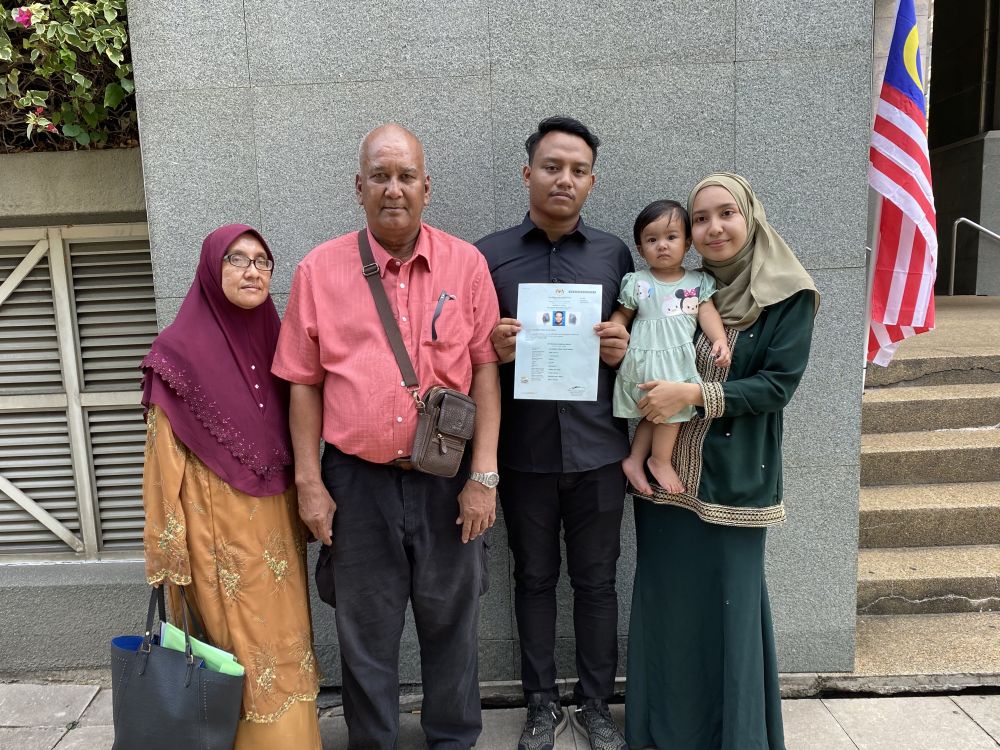
Esports gamer Muhammad Aiman Hafizi Ahmad finally received official recognition as a Malaysian citizen yesterday, days after turning 20 and just a day after the Merdeka celebrations.
Aiman was born on August 17, 2000 in Taiping, Perak to an Indonesian mother and an unknown biological father, but was given to and legally adopted by a Malaysian couple shortly after his birth.
Just days before legally adopting him, the Malaysian couple in September 2000 registered Aiman’s birth, with the birth certificate issued by the National Registration Department (NRD) stating that he was not a citizen, carrying his biological mother’s name and noted that his biological father’s information could not be obtained.
Years of waiting
Aiman grew up in Perak and received his schooling in Kuala Sepetang and Matang in Perak from kindergarten up to secondary school. He also completed the UPSR, PT3 and SPM exams in Perak. He has an elder sister, who is his adoptive Malaysian parents’ biological child and who does not have citizenship issues.
Aiman’s parents Ahmad Sidin and Masniah Ramli made the first application in 2012 (when he was aged 12) for him to be recognised as a Malaysian citizen.
The application was made under Article 15A of the Federal Constitution, through which the federal government can register anyone aged below 21 as a citizen in “special circumstances as it thinks fit”. This means that there is a time limit to when such an application can be made, as those aged above 21 cannot make such applications and have to opt for other routes to be recognised as a Malaysian.
This application was rejected in 2015 by the Home Minister without any reason given.
In 2017 which was also when he was in Form 5, his parents made a second attempt at applying for Aiman to be registered as a citizen via Article 15A.
By 2018, Aiman started playing a popular online game known as PlayerUnknown’s Battlegrounds (PUBG), and began playing competitively with an esports team AROV Esports that in 2019 qualified twice to compete overseas. On both occasions, Aiman could not represent Malaysia in the regional-level championships as he could not travel out of the country without a passport due to his statelessness as he was not a citizen of any country.
Also in 2019, Aiman had as part of another esports team known as VIP Squad won a spot to contest in Singapore for a championship for the Call of Duty game. This championship was later cancelled due to the Covid-19 pandemic.
Aiman previously told Malay Mail that he stopped playing competitively in esports after the repeated thwarting of his desire to travel out of the country to compete regionally.
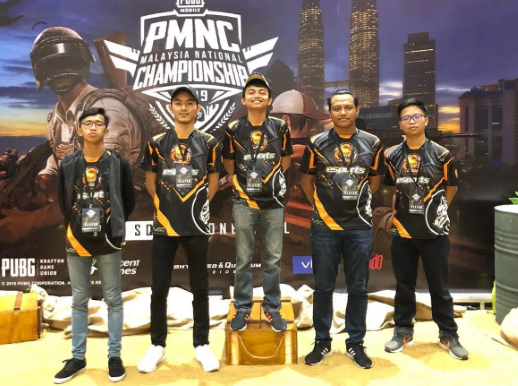
A new hope
When contacted, Aiman confirmed that he collected the certificate of citizenship at the NRD headquarters in Putrajaya at 2.30pm yesterday, accompanied by his parents and his elder sister who had travelled all the way from Perak for this occasion.
“I’m happy and grateful to receive citizenship,” he told Malay Mail, adding that he felt touched at the approval of his citizenship bid.
“Before, I couldn’t do what I wanted to do, when the citizenship application is approved, I feel like a new hope is coming to do what I wish to do,” said Aiman.
Aiman said his family, who have been very supportive of him throughout, were also very happy and thankful to all those who helped him in his citizenship matter.
Aiman, who is based in Bangi, Selangor, said he felt “proud” to receive his certificate of citizenship just a day after August 31. Since August 31 was a public holiday, the certificate could only be collected yesterday. He had applied and paid for the certificate on August 25.
Aiman also applied yesterday for his Malaysian identity card or MyKad, which he said is expected to be ready in one to three months’ time.
Asked what is the very first thing he wants to do when he receives his IC, Aiman answered without hesitation that he wants to sit for both a driving licence and a motorcycle licence.
“It has been long already, since Form Five ― three years ago,” Aiman said of his long-standing wish to obtain such licences.
Aiman will also be able to open a bank account when he has his IC, and that will also be one of the first things he does when his MyKad is issued.
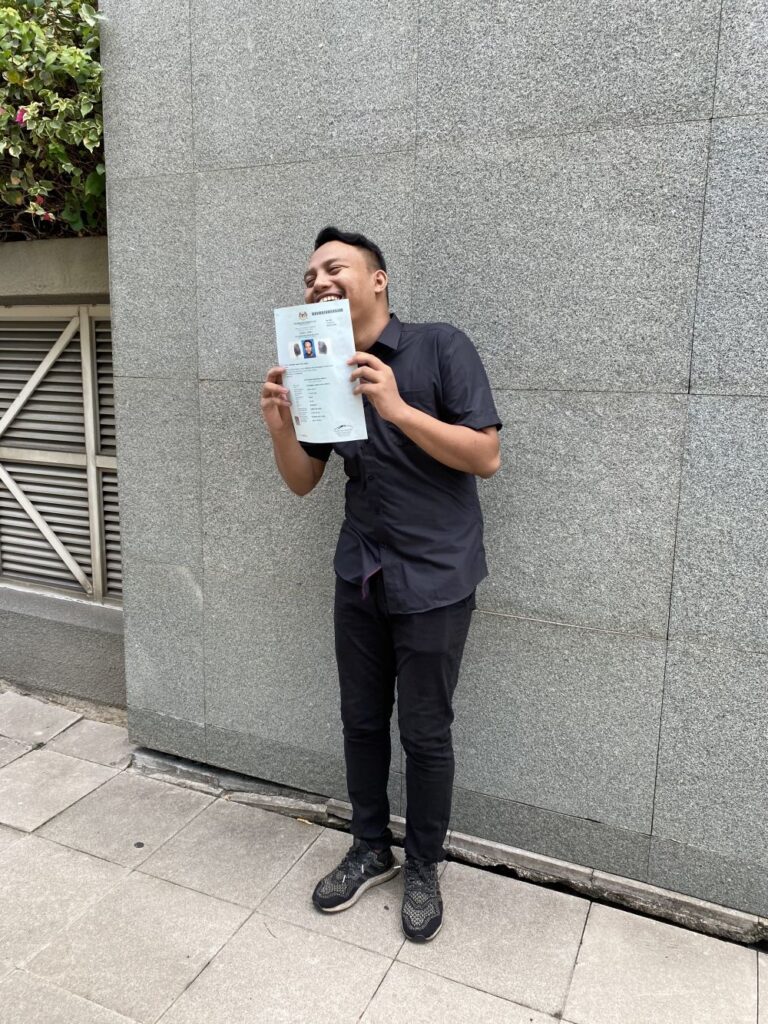
New opportunities await
Now that the Malaysian government has officially recognised him as a citizen, Aiman can look forward to taking up any opportunities that come his way instead of being hampered by his statelessness previously.
“Maybe I will focus on whatever chances that are given, what lies in front of me,” he said.
As an aspiring professional esports athlete and having also held the dream of studying computer science in university, Aiman said he could explore various options including taking up the necessary certificate to further his studies or seek to start his career in competitive esports while also studying.
“All things are possible, see which comes first,” he said.
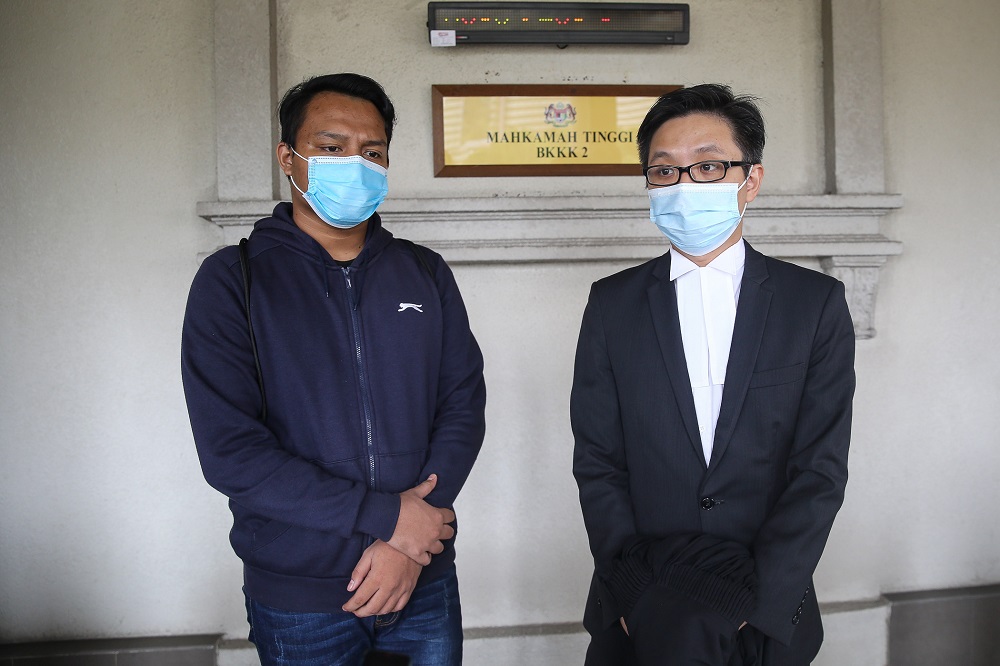
News of citizenship approval
After having waited for years for the government to decide on his 2017 application for citizenship, Aiman in June 2020 filed for judicial review in court and sought to be declared a Malaysian citizen and to be issued a MyKad.
On August 5, Aiman won the High Court’s nod to proceed with the hearing of his judicial review application. No hearing date had been fixed for the matter, as the case was scheduled to come up for case management first on August 19.
Aiman’s lawyer New Sin Yew told Malay Mail that the Attorney General’s Chambers had on August 18 informed him via a letter that the government had approved Aiman’s application for citizenship.
In the August 18 letter, the AGC said the federal government had actually approved Aiman’s Article 15A citizenship application before the court case was filed, while also attaching a Home Ministry letter dated January 9, 2020.
In the letter dated January 9 and addressed to Aiman’s father, the Home Ministry said that it had decided on Aiman’s citizenship application and asked them to collect the decision letter at the ministry’s office in Putrajaya. This letter did not state, however, whether the decision was an approval or rejection of the application.
However Aiman said that he had never received the Home Ministry’s letter dated January 9, 2020 although it was addressed to the correct Perak address where his family stays, adding that he did not know that his citizenship application had been approved much earlier in January as he was not told or informed by the ministry previously.
But Aiman was still happy about the news, telling Malay Mail: “My birthday is August 17, then I received the letter on August 18. I can say that this is the best birthday gift in my 20 years.”
Confirming that Aiman received the certificate of citizenship yesterday, New said of his client: “I’m glad he is no longer stuck in a limbo. He can now pursue his dream of representing Malaysia as a professional esports athlete. And study computer science in a local university.”
As for the court matter that Aiman had filed, New said: “We’ll be discontinuing the case since there is no longer a need for judicial review.”
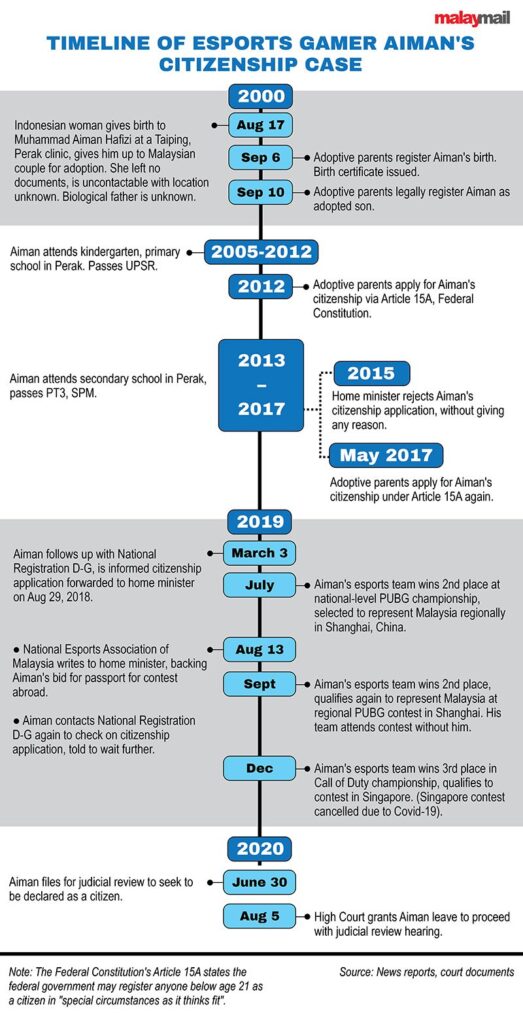
New also noted that there are still many stateless individuals or those without any nationality in Malaysia.
“I’m grateful that the government decided to approve Aiman’s application for citizenship but his case is an exception rather than the rule. There remain many more stateless people who do not enjoy equal rights and equal access to education, healthcare, security, and even legal advice and representation. They are also not part of any official data or statistics so they are often swept under the carpet and treated as being invisible,” he said.
New also spoke of broader solutions for stateless individuals in Malaysia.
“I think three very achievable steps the government can and should take to help resolving the problem of statelessness is: 1. Ensure all births are documented and registered in order to establish proof of parentage and place of birth – which is key to establish proof of nationality.
“2. Make sure all children are granted nationality if they would otherwise be stateless. For example, if their parents are stateless. In this regard, it is important to adhere to section 1(e), Second Schedule, Part II of the Federal Constitution.
“3. Allow mothers to pass on nationality to the child. Currently, Malaysian women married to a non-Malaysian cannot pass her citizenship to the child,” New said.
Under the Federal Constitution’s Article 14(1)(b) read together with section 1(e) of Part II of the Second Schedule of the Federal Constitution, a person born in Malaysia is a citizen by operation of law if they were not born a citizen of any other country.
Lawyers have argued in court over how section 1(e) should be interpreted, including in one citizenship case where lawyer Raymond Mah said that joint reading of section 1(e) with section 2(3) meant that those who do not become citizens of any other country within one year of their birth in Malaysia would be a Malaysian citizen, while the government’s lawyer Maisarah Juhari had contended that sufficient evidence must be shown to prove one is stateless and that one had tried sufficiently to find out the nationality of their biological parents. That case will be decided in court on September 24.


